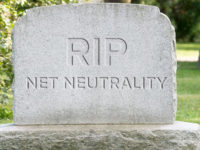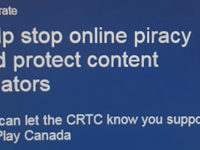Of all the claims that accompanied the launch of the Bell coalition’s website blocking plan – piracy rates (weak evidence) and claims of harm (unsupported by the data), inferences that the absence of a court order is commonplace (it isn’t), that the blocking will be strictly limited (unlikely), and that site blocking is effective (considerable data says otherwise) – the most audacious is surely the repeated assurances that site blocking does not raise net neutrality issues. Given that the starting principle for net neutrality is the right for users to access content and applications of their choice, blocking content is prima facie a net neutrality violation.
News
The Case Against the Bell Coalition’s Website Blocking Plan, Part 8: The Ineffectiveness of Website Blocking
The Bell website blocking coalition unsurprisingly argues that blocking “regimes have been widely adopted internationally because they have been proven to work.” The submission cites data from several countries including the UK, Portugal, and South Korea. As demonstrated last week, the Bell coalition proposal has not been widely adopted internationally. In fact, the overwhelming majority of countries have rejected approaches that do not include court orders. Moreover, a closer look at the data reveals that website blocking is far less effective than its proponents claim.
The Case Against the Bell Coalition’s Website Blocking Plan, Part 7: The Likely Expansion of the Block List to Non-IP Issues
The case against the Bell coalition website blocking proposal has already identified at least two sources of likely expansion and over-blocking: expanding the scope of piracy sites and the over-blocking of legitimate sites that has frequently occurred with site blocking systems around the world. There is a third source worthy of examination, however, namely pressure to expand the block list to non-intellectual property issues (other posts in the series include the state of Canadian copyright, weak evidence on the state of Canadian piracy, the limited impact of piracy, and why the absence of a court order would place Canada at odds with virtually all its allies).
Canada Releases Most of the Updated TPP Text…But the Side Letters Are Still Missing
The Canadian government and other TPP partners released the text of most of the CPTPP yesterday. The release contained few surprises as the TPP remains intact and a new annex identifies the suspended provisions. The list of suspended provisions was revealed several months ago and is particularly notable for the suspension of IP provisions such as copyright term extension, patent term adjustment, technological protection measures, biologics protection, and Internet safe harbour rules.
Bell to Employees: Click Here To Support Our Website Blocking Proposal at the CRTC
A source has provided screen shots of internal Bell corporate correspondence encouraging employees to file interventions at the CRTC in support of its website blocking proposal. The effort to drum up support is not unique: ACTRA posted an advocacy page when the proposal launched complete with suggested language to use at the CRTC and OpenMedia has begun supporting Unfairplay.ca, which allows Canadians to learn more about the issue and make their voices heard. However, internal corporate messaging from Bell to its employees telling them “you can let the CRTC know you support FairPlay Canada” is likely to raise concerns Bell will participate in the CRTC process on its own behalf and provide behind-the-scenes encouragement to employees to add supportive interventions. In fact, iPhoneinCanada quickly ran a story on the issue calling the approach “disingenuous.”

![By Pratyeka (Own work) [Public domain], via Wikimedia Commons, https://commons.wikimedia.org/wiki/File%3AOptus_blocking_TPB.jpg](https://www.michaelgeist.ca/wp-content/uploads/2018/02/Optus_blocking_TPB-200x150.jpg)
![By Jessicadaly (Own work) [CC BY-SA 4.0 (https://creativecommons.org/licenses/by-sa/4.0)], via Wikimedia Commons](https://www.michaelgeist.ca/wp-content/uploads/2018/02/blockinggambling-200x150.jpg)








